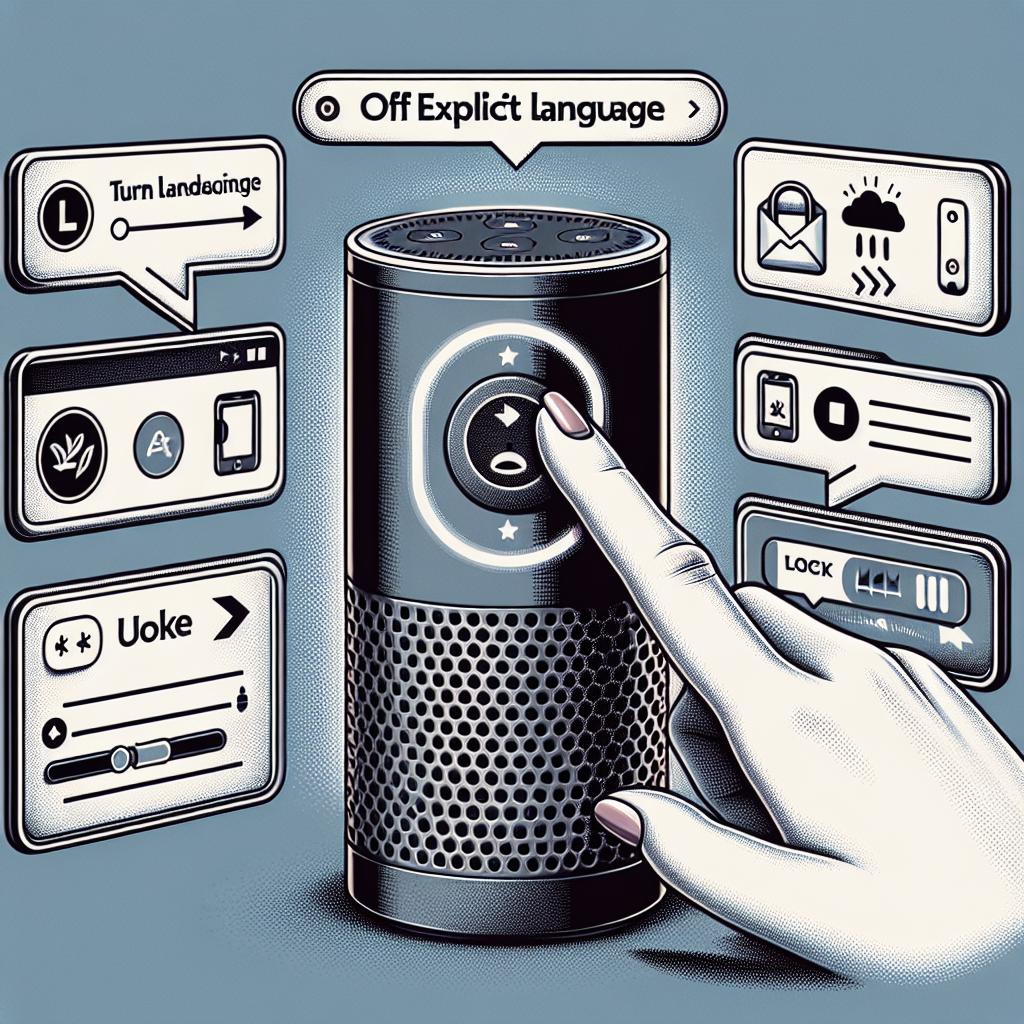“`html
Alexa is an incredibly versatile voice assistant that’s found its way into many households. While it’s useful for many tasks, there are situations where you might want to limit the use of explicit language, especially if kids are around. This blog post aims to provide a comprehensive guide on disabling explicit language on Alexa. We will also cover what you can do if explicit language isn’t turned off, including blocking songs and censoring or replacing lyrics. Additionally, we will discuss if you can turn off profanity filters on Alexa voice profiles. Finally, we will wrap up with some final thoughts and a helpful table summarizing the key points.
How to Disable Explicit Language on Alexa
Disabling explicit language on Alexa is a fairly straightforward process, and it involves using the Alexa app on your smartphone or tablet. First, open the Alexa app and navigate to ‘Settings.’ From there, select ‘Music & Podcasts.’ Within this menu, you will find an option labeled ‘Explicit Language Filter.’ Toggle this option on to enable the filter and off to disable it.
Once the Explicit Language Filter is turned on, Alexa will actively block songs that contain explicit content, ensuring that only clean versions of songs are played. This is particularly useful in households with young children or in professional settings where explicit language could be inappropriate.
It’s also worth noting that some streaming services have their own explicit content settings. For example, Amazon Music, Spotify, and Apple Music each offer ways to control explicit content through their respective apps, and these settings can often work in conjunction with Alexa’s Explicit Language Filter.
What If Explicit Language Isn’t Turned Off on Alexa?
Despite enabling the Explicit Language Filter, there might be situations where explicit language still creeps into your media playback. This could be due to several reasons including miscommunication between Alexa and the streaming service, or specific loopholes in song tagging. Here’s what you can do if you find that the filter isn’t working as expected.
Blocking Songs
If you encounter a specific song that contains explicit lyrics even with the filter enabled, you can manually block the song. To do this, open the Alexa app, go to ‘Settings,’ then ‘Music & Podcasts,’ and find the ‘Blocked Songs’ option. Here, you can add specific songs or artists to the blocked list, preventing them from being played through any Alexa-enabled device.
Additionally, some streaming services allow you to block or flag explicit songs from their own platforms. For instance, on Spotify, you can go into settings and enable the ‘Explicit Content’ filter to ensure that explicit songs are not available to any connected devices, including Alexa.
Censoring/Replacing Lyrics
In some cases, rather than blocking a song entirely, you might prefer to have explicit lyrics censored or replaced with clean versions. Many streaming services offer “clean” versions of songs where explicit lyrics are replaced with more family-friendly alternatives. When you enable the Explicit Language Filter on Alexa, Alexa will attempt to play these clean versions where available.
If you find that explicit content is still being played, you may need to check the settings within your streaming service app. For example, Apple Music often has both explicit and clean versions of popular songs. Ensure you’re selecting the clean versions whenever possible, and these preferences should carry over to Alexa.
Abrupt Warning Disclaimers
On some accounts, users have reported receiving abrupt warning disclaimers if explicit content is detected but not blocked. These disclaimers are designed to inform the user that the upcoming content might contain explicit language. While this doesn’t entirely solve the problem, it gives users a chance to skip the track or find an alternative before the explicit content is actually played.
This feature can be particularly useful when you’re not sure if a song contains explicit content. Alexa’s warning gives you enough time to take action, ensuring that potentially inappropriate content doesn’t reach sensitive ears.
Can I Turn Off Profanity Filters on Alexa Voice Profiles?
Alexa voice profiles allow for personalized experiences based on who is speaking. These profiles can have different settings, including language and content preferences. While you can enable or disable explicit content filters on the primary account, it’s worth noting that each voice profile can have its own settings regarding explicit content.
To customize the settings for individual profiles, go to the Alexa app, navigate to ‘Settings,’ then select ‘Your Voice’ under the ‘Alexa Account’ section. From here, you can create or manage voice profiles. Each profile can be customized to have the explicit filter turned on or off, depending on the needs of the user.
This is especially useful in households with multiple users, each having their own preferences. Parents can have explicit filters turned on for their profiles, while older teens or adults can have the filters turned off if they prefer.
Final Thoughts
Managing explicit content on Alexa is crucial for creating a family-friendly environment or maintaining professionalism. While Alexa’s Explicit Language Filter offers a primary layer of control, additional measures like blocking specific songs and using clean versions of tracks further enhance the user experience. Personalized settings through Alexa voice profiles add another layer of customization, ensuring that each user gets an experience tailored to their preferences.
By understanding the various options available and taking proactive steps, you can seamlessly integrate Alexa into your environment without worrying about unexpected explicit content.
Post navigation
| Section | Key Points |
|---|---|
| How to Disable Explicit Language on Alexa | Navigate to ‘Settings’ in the Alexa app, select ‘Music & Podcasts,’ and toggle the ‘Explicit Language Filter.’ |
| What If Explicit Language Isn’t Turned Off on Alexa? | Check for possible reasons why the filter might not be working and take additional actions like blocking songs. |
| Blocking Songs | Manually add songs to a blocked list in the Alexa app or on your streaming service. |
| Censoring/Replacing Lyrics | Enable clean versions of songs on streaming services and ensure Alexa preferences are aligned. |
| Abrupt Warning Disclaimers | Alexa may provide warnings before explicit content is played. |
| Can I Turn Off Profanity Filters on Alexa Voice Profiles? | Customize explicit content settings for individual voice profiles. |
| Final Thoughts | Utilize various features and settings to manage explicit content effectively. |
“`


